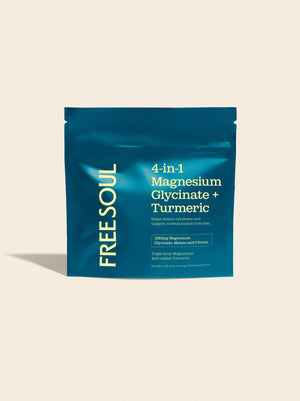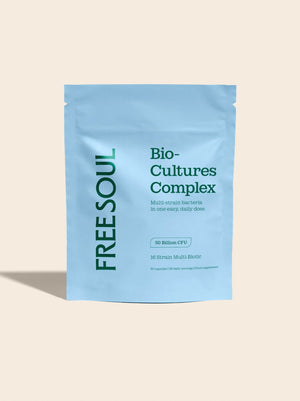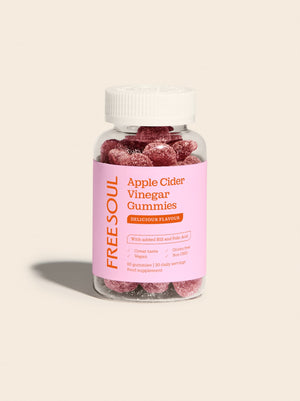As a gut health specialist, understanding the intricacies of the gut and its profound impact on overall health has been a focal point of my career. The gut is not only a digestive powerhouse but also an essential component of our immune system and a communicator with our brain. Proper care and understanding of this system can lead to improved well-being, both mentally and physically. Free Soul Ambassador and gut health expert Marilia Chamon is sharing some of her key strategies to ensure optimal gut health, supported by scientific evidence.
A Balanced Diet Full of Diversity:
When it comes to gut health, diversity and abundance of good gut bacteria is what makes the gut microbiome robust - a study found that eating 30 different types of plants per week is associated with greater microbial diversity in the gut. That may sound like a lot but it can be easily achieved if you eat a variety of fruits, vegetables, whole grains, legumes, nuts and seeds. Different varieties of the same vegetable also count towards this diversity so I mix things up by choosing mixed salad leaves, rice pouches with more than one type of rice, mixed nuts and seeds, different varieties of tomatoes, potatoes, pears, apples to reach that weekly target.
Fermented Foods:
Fermented foods are naturally packed with probiotics – the good bacteria. Consuming foods like kefir, kimchi, sauerkraut, and yoghurt introduce beneficial bacteria to our gut, bolstering its health and functionality.
Prebiotic-rich Foods:
Just like us, our gut bacteria need food. Prebiotics are the non-digestible part of foods that nourish our beneficial gut bacteria. Think of them as fertiliser for the good bacteria. Foods like garlic, onions, asparagus, and green bananas are excellent prebiotic sources.
Hydration:
Water plays a crucial role in maintaining the mucosal lining of the intestines, aiding in nutrient absorption, and promoting the overall health of the gut. A well-hydrated gut helps in smoother digestion and waste elimination. I aim to drink 8 glasses of water throughout the day.
Stress Management:
Our gut and brain are intimately connected via the gut-brain axis. Prolonged stress can disrupt this connection, leading to digestive symptoms. Engaging in stress-relieving activities such as meditation, yoga, or even a simple walk can have positive effects on gut health. I work from home so I like to take mini-breaks every 90 minutes to decompress.
Regular Exercise:
Physical activity can significantly benefit gut health. It has been found to boost the abundance of beneficial gut bacteria and improve gut motility. However, it's essential to strike a balance. High-intensity exercises, when done excessively, can be a double-edged sword for our digestive system. While exercise promotes circulation and can help with the movement of food through the digestive system, extremely strenuous activities can divert blood flow away from the gut to support the muscles. This can lead to reduced oxygen supply to the gut, potentially triggering digestive symptoms and discomfort. In my own routine, I opt for moderate exercises such as weight training.
Adequate Sleep:
Our gut follows a circadian rhythm, just like the rest of our body. Disrupting this rhythm by irregular sleep patterns can impact gut health. Prioritising sleep ensures our gut has the restorative time it requires. I aim for 7-8 hours of sleep per night.
Overnight Fasting:
The concept of giving our digestive system a break isn’t new. Our ancestors often went without food for extended periods, not by choice, but by necessity. This involuntary fasting might have had some benefits we're only beginning to understand. When we allow significant time between meals, especially overnight, our gut gets the much-needed rest to do its job. This method is often referred to as 'circadian fasting', aligning our eating patterns with our body's natural circadian rhythms. Overnight fasting can also support the growth of certain beneficial bacteria. I aim to fast overnight for 12 hours, between dinner and breakfast.
Meal Spacing:
The Migrating Motor Complex (MMC) is a physiological process that occurs in our digestive system. Think of it as the gut's 'housekeeping' service. This wave-like motion in the intestines happens between meals and is responsible for cleaning up undigested particles and bacteria, moving them to the large intestine. When we constantly snack or eat without sufficient breaks, we potentially disrupt the MMC process. This disruption can lead to undigested food particles remaining in the small intestine for longer than they should, increasing the risk of bacterial overgrowth, bloating, and other digestive discomforts. By practising meal spacing, we allow the MMC to complete its cycles, thereby promoting optimal digestive function and reducing the chances of issues like Small Intestinal Bacterial Overgrowth (SIBO). I aim to leave a gap of 4 hours in between meals.
Mindful Eating:
The act of eating is not just about what we eat but also how we eat. Chewing food thoroughly, savouring each bite, and being present during meals can significantly impact digestion. Mindful eating can aid in breaking down food more efficiently, ensuring smoother digestion. It also allows for the release of the appropriate digestive enzymes and can reduce the risk of indigestion and bloating. I aim to chew each mouthful until the food is applesauce consistency.
Limiting Artificial Sweeteners:
Many people opt for artificial sweeteners as a calorie-free alternative to sugar, but recent studies have raised questions about their impact on the gut microbiome. I chose to stay away from them.
Prioritising Oral Health:
Our mouth is the entryway to our digestive system, and oral bacteria can travel down to our gut. Maintaining good oral hygiene practices not only ensures dental health but can also play a role in preventing the introduction of opportunistic bacteria to our gut.
Gut health is a continuously evolving field, with research unveiling new insights regularly. The practices I've shared reflect a combination of clinical experience and the latest scientific findings. Prioritising gut health isn't just about preventing digestive issues; it's about laying the foundation for overall health. I encourage you to approach these strategies with an open mind, adjusting and tailoring them to your unique needs.
Marilia Chamon is a renowned gut health specialist, registered nutritional therapist and a Free Soul Ambassador, she is the founder of Gutfulness Nutrition. Marilia has undergone extensive training on the pathophysiology of IBS in addition to completing the Monash University 'Low FODMAP Diet for IBS' training course for health professionals. She is a SIBO Approved Practitioner and certified in applying functional medicine in clinical practice from the world renowned Institute For Functional Medicine (IFM). Marilia specialises in gut health and IBS as a result of her own health journey, having struggled with unexplained digestive symptoms for nearly a decade, following an episode of food poisoning.












